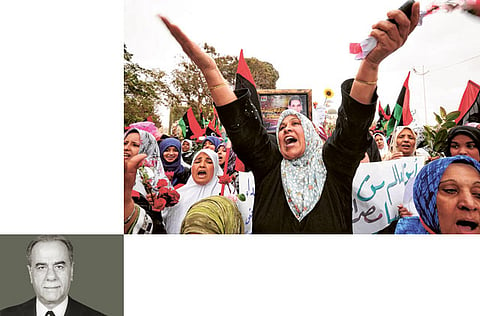France aspires to wider global role
Country's stand on the Arab Spring shows its intention to be a larger player in international politics

The early beginnings of political change in the Middle East started with the Islamic Iranian revolution of 1979. Since then, the region went through an unprecedented period of instability with three major wars, ending in the downfall of the Iraqi state. The official Arab systems also witnessed a complete breakdown.
With the onset of 2011, the Arab Spring emerged, blowing away a number of Arab regimes which no one had anticipated.
These events and the following repercussions prepared the ground for the birth of a new reality in the region, where a new system rules in the framework of new relations between these countries and the rest of the world.
The Arab Spring started around the Mediterranean basin where economic, geopolitical, and cultural interests of the countries overlooking the sea intersect, along with those of the international powers.
There are three continents that overlook the Mediterranean Sea, where Europe occupies most of its northern shores. Africa makes up the southern shores, while Asia makes up its eastern and parts of its northern shores.
The events of the Arab Spring placed the Western powers across the sea with two options. One entails the continuation of treading its traditional road of backing its allies that lack popular mandate. The second involves drawing up a new strategy to win public support in the context of the new realities.
The demands of the people revolting throughout the Arab Spring focused on the daily lives of citizens and their thirst for freedom. The slogans were neither against colonialism nor regression.
And although Western countries were reluctant and hesitant in the beginning of the events, they soon decided to back the Arab Spring and started offering moral, political, and diplomatic support. Finally, aerial military support arrived through the forces of the North Atlantic Treaty Organisation (Nato).
Transformation
In this context, it is inevitable to look at the French stand regarding the whole issue. France quickly transformed a hesitant stand regarding the Tunisian upheaval to a more interested and alert position during the Egyptian uprising, to completely breaking the rules and leading the initiative of Nato's aerial intervention, when Benghazi launched its revolution to topple Libyan leader Muammar Gaddafi.
We may better understand the French stand if its ambitions and French President Nicolas Sarkozy's active nature are taken into account, motivating him to stay one step ahead of events.
The French leadership sees a gap between the country's capabilities as a great power and the actual role available to it in the international political arena. These gaps have worried French leaders since the days of Charles De Gaulle, who was not happy at his country's membership in Nato.
France's economy is the fifth-largest in the world and the second-largest in Europe after Germany. It is the third-biggest country in the world in terms of military spending, and the third nuclear country after the US and Russia. Militarily, France is considered the biggest and strongest in the European Union. Over the past two decades, France has occupied the fourth place in the international arms import market.
France is eager to gain a distinguished leadership position. However, it remains under the US leadership in politics, military, and security affairs vis a vis Nato internationally, and under the German lead economically in Europe. This weakens its leadership quest.
Currently, France is the leader of the Francophone countries only, which does not give it the political edge it requires. Rather, it only maintains relations that go back to the days of colonial dominance.
Hence, the eagerness of the French in backing the Arab Spring can be attributed to the country's ambitions of leadership in the Mediterranean basin.
France is militarily and economically the strongest country on the Mediterranean. It is also the most important country in terms of the colonial history of North African countries across that body of water.
Historically, the Mediterranean Sea is considered one of the most important locations for French strategic ambitions. Throughout this area, France was able to extend its influence to reach North Africa in the 19th century. However, since the establishment of the European Union (EU), French ambitions regarding the Mediterranean have been hemmed by the Union's policies.
The Union for the Mediterranean project, which was presented by Sarkozy in 2008, is part of France's wider ambitions. The project supersedes the European frameworks regarding the same issue, which were approved in the Barcelona conference of 1995 and attended by 15 EU country representatives and 12 non-European countries that are situated around the Mediterranean basin.
Achieving this project requires a big budget where France will be one of the largest contributors. It is unknown whether France's financial situation will allow it to participate in such a manner, although France did recover from the 2008-2009 international financial crisis fairly quickly.
France is keen on going forward with this project and it has registered several brownie points through its stand on the Arab spring. So, the question is, will France's pursuit of this project distance it from Europe?
Dr Mohammad Akef Jamal is an Iraqi writer based in Dubai.



